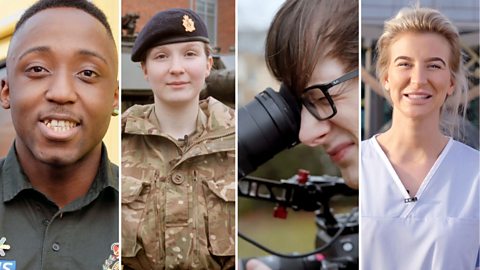Making a difference
Four young people forging frontline careers â as a firefighter, nurse, police sergeant and coastguard â talk about their passion for making a difference, and how theyâre doing things their younger selves may not have thought possible.
UROOSA: My name is Uroosa and I'm a firefighter.
JAMES: My name's James and I'm a mental health nurse.
ANOKHI: My name is Anokhi and I'm a sergeant on the local policing team.
SYDNEY: My name's Sydney and I'm a maritime operations officer.
ANOKHI: If I were walking down the street, in my own clothes, no one would look at me and think twice, "Oh, she's going to be a police officer."
UROOSA: I think I'm definitely part of the journey of trying to change the face of a firefighter.
JAMES: I was a neurodiverse student. I'm now a neurodiverse nurse. So, I have ADHD, dyslexia, and dyspraxia. Nothing should hold me back.
SYDNEY: I didn't know what I wanted to do until I'd finished university. I didn't have any previous maritime experience.
UROOSA: I have faced a few barriers along the way. The biggest of which has been wearing a hijab, which hasn't been done in the UK before. But also, combatting things like fasting and praying and still maintaining my modesty and my faith throughout fulfilling my role as well.
ANOKHI: So, when I first applied for the police and found out I got in, I then told my family and friends and they were very confused. There was that worry, firstly, that it wasn't a very safe career for me as a female. Obviously that's something I was very, very against, because I'm a big believer that women can do everything that men can do.
JAMES: I certainly think anyone who's neurodiverse and wants to work in a, uh, challenging role, because mental health nursing is a challenging role, and I certainly wouldn't want them being put off. And I would encourage them to take part in any role they wanted to take part in.
SYDNEY: I feel this job really makes a difference in the community. And it makes me feel proud that we get to have such an important role in saving people's lives.
JAMES: Being a mental health nurse is a very rewarding role. It can be very tough at times, but seeing a patient through their recovery journey is what keeps us as a team going. And knowing that we're actively helping people.
SYDNEY: So, in this role there's lots of different progression opportunities. You can do training to become a senior maritime operations officer. And then you can progress on from there to be like a team leader or a commander and look after the coastguard network.
UROOSA: Start off as a firefighter, keep working your way up, all the way up to chief.
ANOKHI: After my family saw how well I'd progressed in policing, and seen obviously how happy I am in this job, they are so thrilled for me.
SYDNEY: Don't be afraid if you don't know what you want to do yet.
UROOSA: If it's a passion that you have and you want to be part of that role, you should go for it.
JAMES: Go out, get involved, seize opportunities.
ANOKHI: I think you might surprise yourself as well if you try out something that you've never even thought of.
UROOSA: I feel that I've achieved something fantastic, because I can be a firefighter and still look like me.
SYDNEY: So, I wouldn't say I fit the stereotypical mould of a coastguard.
ANOKHI: We have such strong stereotypes about what police officers should be and I'm so happy to be part of breaking those.
JAMES: Certainly, there are stereotypical views of nursing. Erm, it's considered a female role. But it's certainly not a role that is gender specific. Anyone can be a nurse.
SYDNEY: I hope I can inspire you to become a maritime operations officer. You don't need direct maritime experience. You can finish school and get your qualifications and apply.
JAMES: Most of you won't know what you want to do. If you find something that you enjoy and you like to do, that's the role to go for.
UROOSA: I'm really hoping that me being a firefighter can help to inspire lots of other people, especially young girls and especially Muslim people as well, to realise that they can actually be whatever it is that they want to.
ANOKHI: Having had people come up to me and say "oh, it's really nice that you're doing policing," I really actually think that I am a role model in some weird way. It's very embarrassing to say, but, yeah.
Uroosa: firefighter
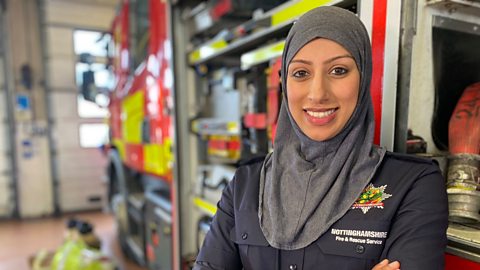
Uroosa, 28, is a firefighter in Nottingham, responding to urgent 999 calls with her crew. She was first inspired to pursue a career in the fire service when firefighters came into her school to deliver a talk. After leaving school, she worked as a personal trainer for several years, until applications in the fire service opened in her area.
The fire service say Uroosa is the UK's first hijab-wearing active firefighter. She has been working with the service to find a breathable and practical hijab for the job.
No two days are the same in Uroosa's job â as well as attending incidents, she spends time training, learning, practising her skills and out in the community doing safety work.
I think Iâm definitely part of the journey of trying to change the face of the fire service. I think people seeing me donât always expect me to be a firefighter.
Uroosa's top tips
- Do your research into what the role involves
- See if you can talk to your local firefighters about their work
- Be patient if the recruitment process isnât open in your area â you can still build up useful experience in the meantime.
For more information about roles in the fire service, head to Izzy's story, Elis' story and Ludwig's story.

Anokhi: police sergeant
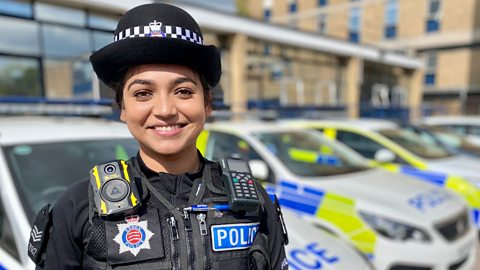
Anokhi, 25, is a police sergeant in Essex. She manages a team of 17 officers who respond to 999 calls in her local area. Sheâs been in policing for over two years, first joining the force through the Police Now graduate scheme, and has been in her current role as sergeant for four months.
Before joining the force, Anokhi didnât think it was a role for her. Sheâd never met or interacted with a police officer before and didnât know any personally, but she felt it was really important to have someone from her community on the force.
Being a British Asian woman in the police force does mean that sometimes you're the only one in the room, and that's something you have to deal with, but it is slowly changing and I actually see more and more British Asian people and people of colour joining the police, so that's lovely to see.
Anokhi's top tips
- Try not to be too intimidated by the application process. It does take a while but that doesn't mean it's not worth it â it is!
- During the interviews, you'll be asked to respond to scenarios to see how you would react. They want to see how you would behave in real life, so don't be tempted to act!
- Embrace your own unique set of skills. Everyone is different and the police has a place for everyone.
To hear more about life in the police force, check out police constable Dylan's story.

James: mental health nurse
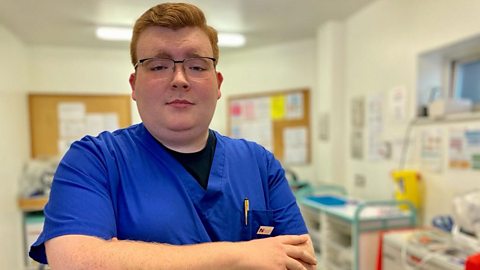
James, 23, is a mental health nurse working in Liverpool. Having originally planned to study Politics at university, he found a passion for healthcare whilst working in a care home when he was 16. He changed his course to Nursing and has recently qualified.
In his current role, James mainly works with elderly patients with dementia, caring for his patients and administrating medication. There is no such thing as a typical day for him â each patient needs individualised care so every day is different.
Certainly there are stereotypes of nursing â itâs considered a female role. In truth, most nurses are female but it's certainly not a role thatâs gender specific⦠anyone who has the passion and drive to become a nurse can become a nurse.
James' top tips
- Speak to student nurses to find out what it's like to train
- Try to improve your communication skills â these are really useful for talking to patients and their families
- When you're building experience, don't be afraid to say what you want to learn.
To learn more about life in nursing, check out our How to become a nurse collection.

Sydney: maritime operations officer
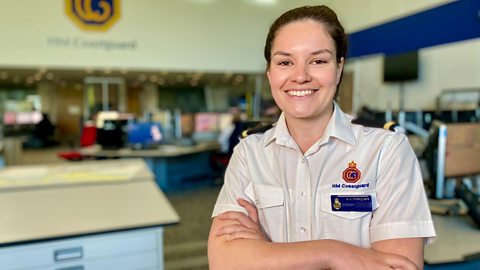
Sydney, 23, is a maritime operations officer, coordinating emergency responses to coastal and maritime incidents along the south coast of England. She takes 999 and mayday calls, sending out coastguard rescue teams, lifeboats and helicopters to assist people who need rescuing. A typical shift starts at 7am or 7pm and involves speaking to lots of different people, such as members of the public and the other emergency services.
Sydney studied Film Production at university but found out about her current role whilst working as a RNLI lifeguard during her summers. After overhearing conversations with the coastguard over the team radio, she thought it sounded like an interesting career but that you'd probably need prior maritime knowledge for the role.
The moment I realised I could do the job was when I saw it advertised on the civil service website. I read the job criteria and realised I didnât need any specific experience on boats and that I was eligible to apply.
Sydney's top tips
- Try to get experience of talking on the phone and radio â maritime operations officers need to be able to talk calmly to people who are stressed or in high pressured situations
- Don't be put off if you donât have any maritime experience, youâll learn all you need to know during your training
- Do your research and don't be afraid to ask questions.
Hear more about life as a maritime operations officer on Sydney's job profile.

Where next?
Job inspiration: Careers in healthcare and frontline services. collectionJob inspiration: Careers in healthcare and frontline services
Hear from people working across the healthcare sector and in frontline services, including some roles you may not know existed!
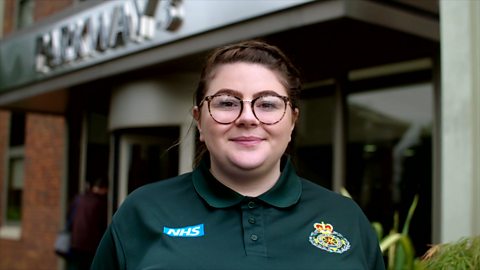
Careers A to Z: Find your perfect job
From actor to zoologist, find the right fit for you.

More from Bitesize Careers
Hear from young people about the world of work.
